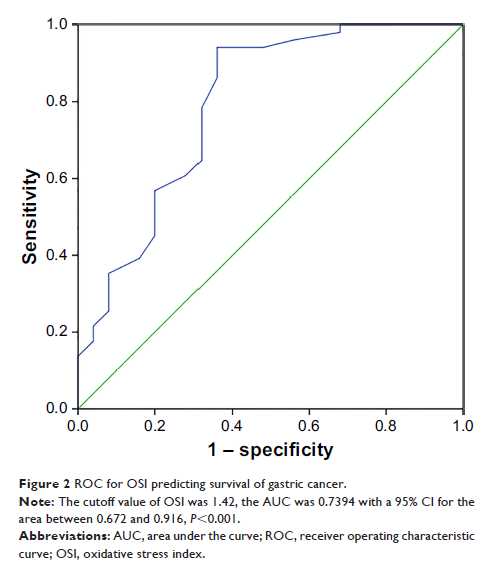108384
论文已发表
注册即可获取德孚的最新动态
IF 收录期刊
- 3.4 Breast Cancer (Dove Med Press)
- 3.2 Clin Epidemiol
- 2.6 Cancer Manag Res
- 2.9 Infect Drug Resist
- 3.7 Clin Interv Aging
- 5.1 Drug Des Dev Ther
- 3.1 Int J Chronic Obstr
- 6.6 Int J Nanomed
- 2.6 Int J Women's Health
- 2.9 Neuropsych Dis Treat
- 2.8 OncoTargets Ther
- 2.0 Patient Prefer Adher
- 2.2 Ther Clin Risk Manag
- 2.5 J Pain Res
- 3.0 Diabet Metab Synd Ob
- 3.2 Psychol Res Behav Ma
- 3.4 Nat Sci Sleep
- 1.8 Pharmgenomics Pers Med
- 2.0 Risk Manag Healthc Policy
- 4.1 J Inflamm Res
- 2.0 Int J Gen Med
- 3.4 J Hepatocell Carcinoma
- 3.0 J Asthma Allergy
- 2.2 Clin Cosmet Investig Dermatol
- 2.4 J Multidiscip Healthc

可手术治疗的晚期胃癌患者血清总氧化/抗氧化状态的临床意义
Authors Du X, Zhang L, Zhang D, Yang L, Fan Y, Dong S
Received 12 October 2017
Accepted for publication 19 July 2018
Published 10 October 2018 Volume 2018:11 Pages 6767—6775
DOI https://doi.org/10.2147/OTT.S153946
Checked for plagiarism Yes
Review by Single-blind
Peer reviewers approved by Dr Colin Mak
Peer reviewer comments 2
Editor who approved publication: Prof. Dr. Geoffrey Pietersz
Purpose: Oxidative stress was significantly associated with the development of malignancies. The purpose of this study was to evaluate the significance of serum total oxidant/antioxidant status in operable advanced gastric cancer patients.
Materials and methods: A total of 284 patients who underwent curative resection for primary stage III gastric cancer were enrolled. Total oxidant status, total antioxidant status, and oxidative stress index (OSI) were evaluated within 24 hours before surgery, and compared with 120 healthy donors. The correlation between the OSI and survival outcome was analyzed by the Kaplan–Meier method with log-rank test and Cox’s regression methods, respectively.
Results: Mean OSI of gastric cancer patients was higher than healthy controls (1.41±0.96 vs 0.78±0.42, P <0.001). All patients were stratified into two groups using the optimal cutoff value (1.42) of OSI using a sensitivity of 94.1% and a specificity of 64.0% as optimal conditions from receiver operating curve analysis. Patients with an OSI ≥1.42 had poorer mean overall survival (45.6 vs 29.8 months, P =0.022) and mean recurrence-free survival (43.3 vs 28.1 months, P =0.011) than patients with an OSI <1.42 in univariate analysis, and OSI was also confirmed as an independent predictor for survival for gastric cancer in multivariate analysis (hazard ratio, 0.541; 95% CI: 0.127–1.102; P =0.01).
Conclusion: Preoperative OSI can be considered as an independent prognostic factor for operable and advanced gastric cancer.
Keywords: oxidative stress index, survival, gastric cancer
